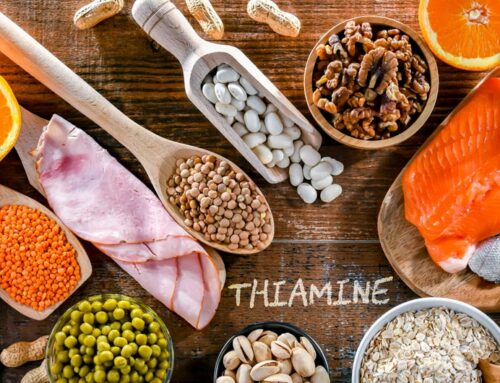Vitamin B12 is one of eight B vitamins and it plays important roles in the body. It works in conjunction with other B vitamins to perform many functions. For example, Vitamin B12, works with Vitamin B9 to help create red blood cells, and also helps iron work better in the body. They also work closely together to help immune function and mood.
Deficiency
It is rare for young people to be deficient, but a deficiency is something to be cognizant of as we age. As you age, you produce less hydrochloric acid (stomach acid), and the body needs that to absorb Vitamin B12. Low levels of B12 can cause numbness, nervousness, fatigue, shortness of breath, diarrhea or a tingling in fingers and toes. A severe deficiency of B12 can cause nerve damage.
Since Vitamin B12 is found only in animal products, vegans and Vegetarians must take a supplement to ensure they are getting enough. Other people at risk for deficiency are people who have trouble absorbing nutrients due to weightloss surgery, Crohns Disease, the elderly, and those with diabetes and pancreatic disease. Even some medications may affect absorption of this vitamin.
Usefulness
Vitamin B12 is commonly used to treat Pernicious Anemia, whose symptoms can include but are not limited to weakness, fever and loss of balance. It may also be used to reduce the risk of age related macular degeneration, an eye disease that causes loss of vision.
Vitamin B12 works with Folate, and may serve to reduce the risk of breast cancer. Vitamin B12 also has a beneficial effect on sperm count, and their ability to swim.
Dietary Sources
- B12 is found only in animal foods like fish, shellfish, eggs, dairy, beef, pork and organ meats.
- B12 can also be found in multivitamins, B complex vitamins and individual supplements.
- It can be sold under its scientific name cobalamin and cyanocobalamin.
If you are vegan or vegetarian consider taking a supplement to meet your requirements.
The elderly may be more at risk of not getting enough as the body’s ability to absorb this nutrient declines with age, due to the decrease in stomach acid. Ask your health care provider to assist you in ensuring you get your optimum dose.
Daily recommendations
Pediatric
- Newborns to 6 months: 0.4 mcg (adequate intake)
- Infants 6 months to 1 year: 0.5 mcg (adequate intake)
- Children 1 to 3 years: 0.9 mcg (RDA)
- Children 4 to 8 years: 1.2 mcg (RDA)
- Children 9 to 13 years: 1.8 mcg (RDA)
- Teens 14 to 18 years: 2.4 mcg (RDA)
Adult
- 19 years and older: 2.4 mcg (RDA)*
- Pregnant women: 2.6 mcg (RDA)
- Breastfeeding women: 2.8 mcg (RDA)
Because 10 to 30% of older people may not absorb B12 from food very well, people over 50 should meet their daily requirement through either foods fortified with Vitamin B12 or a supplement containing B12.
Due to the potential for side effects, and reactions with other medications, you should always consult a physician before taking any dietary supplement.
References: https://www.mountsinai.org/health-library/supplement/vitamin-b12-cobalamin







Leave A Comment